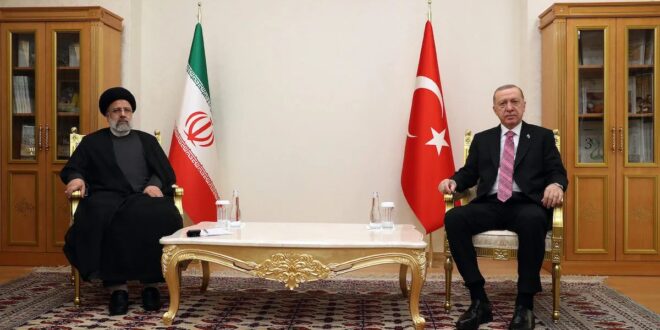Iran has announced that it stopped the flow of natural gas to Turkey for ten days, starting from 20 January, due to a “technical failure”. This resulted in an electricity crisis for factories in Turkey. Questions have been raised about the validity of the Iranian justification and the reality behind the action. Is it, for example, related to Turkey’s recent moves towards reconciliation with the Gulf States?
Turkish President Recep Tayyip Erdogan called his Iranian counterpart, Ebrahim Raisi, on Saturday to discuss this issue, along with bilateral relations and regional matters, but the crisis is continuing, despite Tehran’s announcement that the flow of gas to Turkey has resumed. Ankara has pointed out that Iran has not stuck to its commitments, though, and that the amount of gas it is now sending is not what had been agreed. International arbitration will be resorted to, said Turkey, if Iran does not meet its obligations.
According to media reports, a Turkish delegation in Tehran discovered that Iran had cut the gas supply in order to meet domestic demand. A “technical failure” was, therefore, simply not true and there is more to this than meets the eye. It is necessary to look elsewhere to discover the real cause of the gas crisis between Turkey and Iran.
Turkey announced its new economic programme a while ago to halt the slide in the value of the lira, the success of which depends on production and export. With the production process underway, Turkish exports were reaching record levels. However, with power cuts due to the lack of gas for power stations, the production process was always going to be hindered, striking a blow to the economic recovery programme. This, in turn, no doubt embarrassed the government in front of the Turkish people, making it appear to be unable to provide energy in the middle of winter.
Analysts believe that Ankara’s reconciliation efforts in the Gulf, and even with Armenia, may also be behind Tehran’s gas move. Such efforts have started to bear fruit. Abu Dhabi Crown Prince Mohammed Bin Zayed Al-Nahyan visited the Turkish capital at the end of November, and Erdogan said that he will visit the UAE and Saudi Arabia in February. Talks to normalise relations between Turkey and Armenia began about two weeks ago, with representatives meeting in Moscow.
All of this worries Tehran and threatens its interests. The move to cut the gas supply may have been the Iranians sending a message to Ankara that it is not happy with such reconciliation efforts in general, and Turkey-Gulf rapprochement in particular.
Whatever the causes of the gas crisis are, they clearly highlight the importance of energy independence and alternative sources of supply. Turkey needs to diversify its sources as a matter of urgency, so that it cannot be held “hostage” in this way. It has intensified its exploration for oil and gas, on land and at sea, in the effort to be energy self-sufficient. Ankara has announced the discovery of 540 billion cubic metres of natural gas in the Black Sea and expanded its investments in renewable and nuclear energy projects. The first unit of the Akkuyu Nuclear Power Plant is expected to be completed in the spring of 2023, and the Black Sea gas field will enter service next year. In the meantime, Turkey still needs to import oil and gas until the desired self-sufficiency is achieved.
Nevertheless, an expert in energy affairs and advisor at the Ministry of Foreign Affairs, Caner Can, notes that Turkey’s dependence on Russia and Iran for natural gas has decreased significantly over the past fifteen years, falling to 44.65 per cent of Turkey’s total natural gas imports in 2020 from 81.9 per cent in 2005; the proportion of this from Iran was only 11 per cent in 2020. This means that Ankara realises that this dependence not only threatens its national interests, but also its future plans and the independence of its foreign policy, and is taking appropriate steps to remedy the situation.
 Eurasia Press & News
Eurasia Press & News


